- Home
- Shirley Jackson
Hangsaman Page 3
Hangsaman Read online
Page 3
“I am not a vain man,” he began slowly. “I do not hold myself in undue estimation. As a matter of fact, my own description of myself would be much harsher than yours. You do not mention my pettiness, for example, although you hint at it in your statements about”—he consulted the notebook—“the fact that I ‘substitute words for actions.’ You overlook one of my outstanding characteristics, which is a brutal honesty which frequently leads me into trouble—an honesty so sincere that, applied to myself, it gives me a picture I cannot be proud of, although you name me as a proud man. My honest picture of myself has led me to aim less high than many of my contemporaries, because I know my own failings, and as a result I am in many respects less successful in a worldly sense. They, without knowledge of their own shortcomings, were able to conquer blindly, while I, always hesitating through doubt of myself, lost my chances, and fell. You do not mention—and I am using that same brutal honesty on myself now—that I am not always so kind to my family as I should care to be, because I am perhaps too much concerned with my own emotions at the expense of theirs—although, to speak with bitter truth, I am a person not gifted with great emotions and consequently, while I can never be sentimental, I can never be great.” He seemed about to go on in this strain, which was a favorite of his, but then recollected himself, and said wryly, “I reveal myself more with every word. I am honest, Natalie, and sometimes ashamed of it.”
“I always am, when I’m honest,” Natalie said.
“Are you?” he asked with interest. “Do you know when you’re being honest?”
“Usually,” Natalie said. “If I’m surprised at myself for saying or thinking it, it’s honest.”
He laughed and nodded, and then said, “You teach me as much as I teach you, my dear.” They were both quiet for a minute, counting over their individual virtues, and then he went on, his voice confidential. “Natalie,” he said solemnly, “you know by now that it is natural for girls to hate their fathers at some point in their growth. Now I submit that at this time of your life you are growing to hate me.”
“No,” Natalie said. She stared at him. “Of course I don’t hate you,” she said. The remark had come so in a context of discussion that it was a moment before she thought to say, “I love you.”
He shook his head sadly. “When you were born, and when Bud was born, I realized, even though your mother did not, that there would come a time when you would both rebel against us, hating us for what we represented, fighting to get free of us; it’s a reaction so natural that I am ashamed to think that now I have a pang, a twinge, when I recognize it at last; it has been slow in coming, but I am as unprepared for it as I have ever been. Natalie, you must remember that it is natural, that hatred of me does not imply that you as a person hate me as a person, but only that the child, growing normally, passes through a stage when hatred of the parents is inevitable. That is your stage now.” He held up his hand again as Natalie tried to speak and then, when she subsided, dropped his hand back to the pages of Natalie’s notebook, which he touched as he talked, fumbling with the pages which held her assignment for that morning.
“That does not mean,” he continued thoughtfully, “—although, remember, this is actually a new experience for me as well as for you—that does not mean that I am not able to help you, or advise you, or sympathize with you; it only means that we must recognize now that you are a growing girl and I an old man, and that a basic sex antagonism, combined with a filial resentment, separates us, so that we cannot always be honest with one another as we have been up to now.”
If it’s happening why does he tell me? Natalie thought briefly, and heard from far away the police detective demanding, “Are you prepared to confess that you killed him?”
For a long minute her father looked at her, obviously expecting some answer which she was unable to give; Natalie, her mind moving swiftly, went back over what he had said: what had there been, for instance, which indicated what she was to say? Had he asked a question, perhaps? Made a false statement she was to correct? Praised her, to hear her disclaim modestly?
“Well,” her father said at last, and sighed. “It is not necessary to discuss it in detail, my dear. You will soon know more about it than I do. And I shall learn from you.”
He sat back in his chair, and stared reflectively down at the desk, his eyes reading absently the lines of Natalie’s notebook.
“Handsome,” he said, and laughed. “Oh, Natalie, my dear.” And he shook his head helplessly.
It was a dismissal. Nothing was to be further identified. As Natalie rose, her mind already moving ahead to the garden, to lunch, to the length of the day stretching ahead, her father pushed the notebook impatiently across the desk.
“You will be at the party this afternoon?” he asked, accenting the “you” just enough to make Natalie remember Bud’s refusal to come.
“I guess so,” Natalie said lamely because she was wondering where Bud found the courage to announce publicly that he was not bound by family plans.
“Try to help your mother, if you can,” her father said. “Entertaining is difficult for her.” He smiled up at Natalie, his mind already going on to more important things, the deep complex ideas that were his own work. “A fundamental hatred of people, I believe,” he added as Natalie went toward the door.
* * *
On Sundays the Waites regarded themselves as living in a carefree, bohemian fashion, although for the other six days of the week they lived like everyone else. Mrs. Waite was not allowed the services of her maid on Sundays, and on Sundays the Waites usually entertained, with what Mr. Waite confidently referred to as potluck, although it was Mrs. Waite who dealt with the pot—the only reason the Waites were able to keep a maid at all. Mr. Waite customarily invited anyone who pleased him over for Sunday afternoon at his house, and Mrs. Waite was expected to provide various manner of refreshments for Mr. Waite’s casual guests. This included, usually, one or another form of small sandwiches and canapés for any number of people—since Mr. Waite was never able to remember whether he had or had not invited any given person—and buffet supper afterwards; Mrs. Waite had thus established for herself a strict eight-o’clock Sunday bedtime, retiring at about the time Natalie and Bud were released from Sunday bondage and Mr. Waite was settling down with his convivial guests.
Natalie and her mother spent Sunday mornings, after Natalie’s visit with her father, in the kitchen preparing for the day’s guests; Mrs. Waite thought of this as good training for her daughter, and Natalie, telling her father about her mother, had once remarked, “She makes the kitchen like a room with a sign saying ‘Ladies’ on the door.”
The kitchen was, in fact, the only place in the house that Mrs. Waite possessed utterly; even her bedroom was not her own, since her husband magnanimously insisted upon sharing it. He shared also the dinner table and the services of the radio in the living room; he felt himself privileged to sit on the porch and to use a bathtub. In the kitchen, however, Mr. Waite amusedly confessed himself “inadequate,” and so Mrs. Waite, one day a week, was allowed a length of time unmolested except for the company of her daughter. Perhaps, even, Mrs. Waite felt that in these hours that they shared the kitchen, she and Natalie were associated in some sort of mother-daughter relationship that might communicate womanly knowledge from one to the other, that might, by means of small female catchwords and feminine innuendoes, separate, at least for a time, the family into women against men. At any rate the kitchen alone with Natalie was the only place where Mrs. Waite talked at all, and probably because she talked so little elsewhere she made her conversation in the kitchen into a sort of weekly chant, a news bulletin wherein all that Mrs. Waite had thought or wanted to say or felt or surmised during the week was aired and considered, in combination with Mrs. Waite’s refrain of reminiscence and complaint. Natalie admired her mother at these times, and, although she would go to any length to avoid even the slightest conversation with her mot
her in the living room, she enjoyed and profited by the kitchen conversations more than even Mrs. Waite suspected.
This morning Mrs. Waite’s initial momentum came from her Sunday casserole which, incredibly complex and delicate, would be devoured drunkenly in a few hours by inconsiderate and uncomplimentary people. When Natalie came into the kitchen her mother was leaning over the sideboard, slicing meat beautifully thin with the butcher knife. “Natalie?” she said without looking around. “Did you hear him?” she went on, without assuring herself that it was really Natalie and not Mr. Waite come to announce that the house was on fire. “Did you hear him? He’s an old fool, he really is.” She held her breath to cut daintily around a bone, and then went on. “Sometimes I think he must be an awful fool, to think people are taken in by his pretensions. Paranoid,” Mrs. Waite announced with satisfaction. “Paranoid. My father used to laugh when he came, he really did. Paranoid. Natalie, I wish Ethel would leave dishes the way I leave them. Little ones inside big ones. It’s impossible to believe that anyone can put dishes away in this sort of insane arrangement; she piles them all together without thinking of size or safety. Used to laugh. Sometimes I think he only married me because my name was Charity and it was the fashion then for people like your father to sing songs like ‘Buffalo Gals’ and dance a Virginia reel. Charity. My father knew what he was doing.”
Natalie’s Sunday morning work usually began with the salad greens. She washed lettuce and carrots, tomatoes and radishes, cleaned them and set them in cold water to be made into salad at the last minute. With both hands full of lettuce leaves, now, she stood at the sink watching the waterfall of the cold water running from the faucet through the clear green of the lettuce. It was incredibly beautiful until her hands began to chill.
“Too lazy to do anything for himself,” Mrs. Waite said. “Imagine a grown man taking up square-dancing in New York City. I remember my mother, a real scold she was. Her voice up here all the time, and I sometimes think your father would profit by her, although before she died she did get pretty quiet without my father. I always used to wonder how people made happy marriages and made them last all day long every day. Seemed to me my mother wasn’t happy but then of course I didn’t know. Natalie, see that your marriage is happy.” She turned and looked earnestly at Natalie, the knife resting against her palm. “See that your marriage is happy, child. Don’t ever let your husband know what you’re thinking or doing, that’s the way. My mother could have done anything, anything she wanted, my father would have let her, even though probably he wouldn’t have known. Of course, by the time he died she was too old.” Mrs. Waite took the thin slices of meat and began to arrange them in the baking dish. “I remember Sundays at home,” she went on.
“You want me to hardboil eggs?” Natalie asked softly.
Mrs. Waite thought, looking around at the kitchen as though the casserole or the lettuce had an opinion she was waiting for. Finally she said, “I guess we’d better, Natalie. Can’t ever tell how many will come.” She smiled as she went on, “Sundays at home, we never knew how many were coming. Sometimes we’d go to my grandmother’s, or to one of my sisters’. All my sisters married before I did, Natalie, there’s something for you. They could have told me. Or else they’d come to our house. We never knew. They were like a flock of birds—one would take off for someplace, and then the rest would follow. All big men, small women. My uncles—when I remember them I see them sitting on Sunday afternoons, sometimes in one house, sometimes in another. Take my uncle Charles; I usually remember him sitting in the red chair in our dining room—we had to bring chairs in, they’d be so many at table—or else in the old brown mohair chair he kept by the fireplace in his own house. Aunt—what was her name, Natalie? Who married Charles?”
“Helen,” Natalie said.
“Helen,” Mrs. Waite said. “Well, she used to hate that chair, except I always used to think then that she only made such a fuss because she knew wives always hated their husbands’ old dear things and she was afraid no one would respect her if she let him keep the chair without a fuss. Except I don’t think she ever paid much attention to doing it seriously.” She slid her knife through the piece of cooking butter on the plate, and began to slice an onion. “Fancy African masks,” she said. “Cheap dirty silver jewelry. Old blues records you wouldn’t want to know the words of if you could hear them. Anyway, I always remember that uncle sitting in that chair. I guess all young girls—more water there, Natalie—get to hate where they’re living because they think a husband will be better. What happens is that a husband’s the same, usually. When I met your father he had a lot of books that he said he read, and he gave me a Mexican silver bracelet instead of an engagement ring, and I looked around at my uncles sitting in their old goddam—your father taught me to say goddam, too, and a lot of words else I could tell you if I wanted, although I do believe I’ve outgrown that part of it—chairs and I thought being married was everything I wanted. Only of course it’s the same, only now it’s strangers for Sunday dinner, and your father will be sick all tomorrow if he smokes anything stronger than cigarettes. Let’s have a potato salad. I told Ethel to boil extra potatoes yesterday.”
Natalie had discovered that by a slight pressure on a back tooth she could make a small regular stirring pain that operated as a rhythmic counterpoint to her mother’s voice; she would not for the world have told her mother that she had a cavity in her tooth, but it was a pleasant change in her body since the day before, and she enjoyed it.
“Ice cream,” Mrs. Waite said. “We always used to have ice cream.”
“Tell me,” the detective said insistently, leaning forward, “tell me how it was done; you may rely on my not using the information against you.”
“I don’t know,” Natalie answered silently. “I don’t remember.”
“I can promise you,” the detective said with great dignity, “that I am a reasonable person to confide in. I can be trusted absolutely.”
“I don’t remember,” Natalie told him.
“Of course you remember,” the detective said impatiently. “No one can live through such things and not remember them.”
“Natalie,” Mrs. Waite said, her hands quiet for a minute while she stared at the wall before her, “what will I do when you’re gone?”
Embarrassed, Natalie carefully turned down the flame under the boiling eggs. “I’ll be back a lot,” she said inadequately.
“A mother gets very lonesome without her daughter,” Mrs. Waite said. “Especially when it’s an only daughter. A mother gets lonesomer than anything in the world.”
One of the things which Natalie most disliked about her mother was Mrs. Waite’s invariable trick of putting serious statements into language that Natalie classified as cute. Mrs. Waite, too long accustomed to seeing her most heartfelt emotions exposed, discussed, and ignored, had long since fallen into protecting herself by stating them as jokes, with an air of girlish whimsy which irritated both Natalie and Mr. Waite as no flat statement of hatred could have. Because of this, Natalie—who had sometimes thought of running to her mother with a voluntary expression of affection—said briefly, “You’ll find something to do.”
Mrs. Waite was silent. She had set the casserole carefully into the oven and turned her attention to the silverware before she began again, very timidly, “And at home when we had no dishes for all those people we used to ask one of the aunts to bring along . . .”
* * *
Lunch on Sundays was a pick-up meal; Mrs. Waite had over the years prevailed upon her husband to accept the fact that the oven would not hold at the same time an unusual meal for his friends and the correct nourishing lunch he believed his due. Although in most ordinary matters Mr. Waite would far sooner have sacrificed his friends than himself, in the question of his hospitality and the probable Monday conversations about it, Mr. Waite was willing, with objections, to forego his own comfort, always believing that it was a temporary
measure due to Mrs. Waite’s inefficiency and that the next Sunday would see him sensibly fed. Since it was his custom to greet regular occasions with regular remarks, Mr. Waite habitually observed over his Sunday peanut-butter sandwich, “This is not food for a grown man.”
On Sundays Mrs. Waite had an answer for him, probably because originally she had had all the week to prepare it; she habitually answered, “You make the dinner and I’ll make the lunch.”
Standing at the kitchen table next to her father, Natalie looked peacefully at the scene of competence around her. The dishes used in the morning had been washed, the breakfast cups and saucers put away, and the company cups and saucers set out instead. The family napkins, suspended for the present lunch and dinner, reposed on the kitchen mantel to be brought out again on Monday. The very familiar kitchen things—the plant which Ethel kept beside the sink, the smaller teakettle, the plastic-handled tableware—were all pushed back and set aside before the company preparations. Natalie, because her mother and father were bickering, transplanted herself to an archeological expedition some thousand years from now, coming unexpectedly upon this kitchen and removing layers of earth carefully from around the teakettle—“This may have been a cookpot,” someone said wisely, and someone else added, “Or of course a chamber pot; we have no notion as yet of the habits of these peoples.” Further excavations—perhaps three or four days later, and after serious quarrels between the junior and senior members of the expedition, one force maintaining that it would be more sensible to move on; this was an infertile spot for discovery and besides the air was bad—might yield the skull of Natalie, and one, holding her precious head in his hands, turning it over and examining it intimately, might remark, “Look, here, at these teeth; they knew something of dentistry, at any rate—see, here’s one filled, with gold, it appears. Had they any knowledge of gold, do you remember? Male, I should say, from the frontal development.” At that time, of course, Natalie reflected with contentment, her life would be done. There would be no further fears for Natalie, no possibility of walking wrong when you were no more than a skull in a strange man’s hands. “And see,” another voice called from the end of the kitchen, “see, here, these very strange objects—ornaments, I’d judge. And look here, at these two skeletons here—see, look here, they had children.”

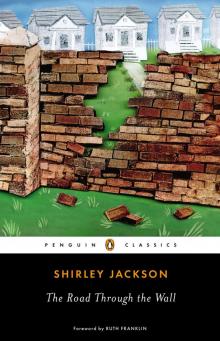 The Road Through the Wall
The Road Through the Wall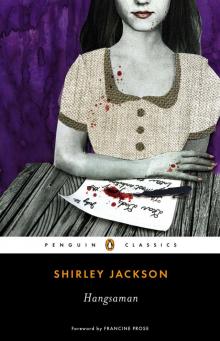 Hangsaman
Hangsaman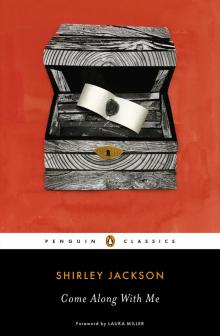 Come Along With Me
Come Along With Me The Lottery
The Lottery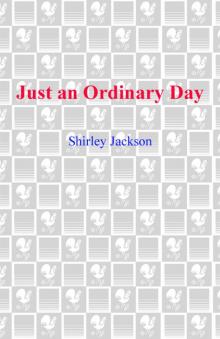 Just an Ordinary Day: Stories
Just an Ordinary Day: Stories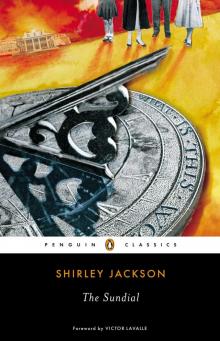 The Sundial
The Sundial Dark Tales
Dark Tales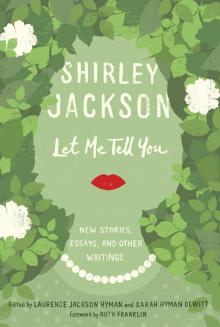 Let Me Tell You: New Stories, Essays, and Other Writings
Let Me Tell You: New Stories, Essays, and Other Writings The Haunting of Hill House
The Haunting of Hill House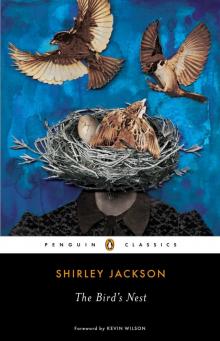 The Bird's Nest
The Bird's Nest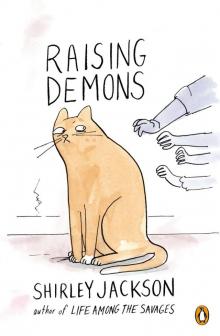 Raising Demons
Raising Demons We Have Always Lived in the Castle
We Have Always Lived in the Castle The Letters of Shirley Jackson
The Letters of Shirley Jackson The Missing Girl
The Missing Girl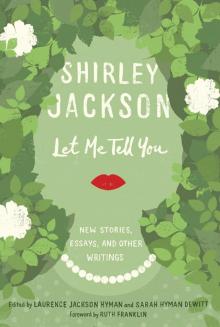 Let Me Tell You
Let Me Tell You